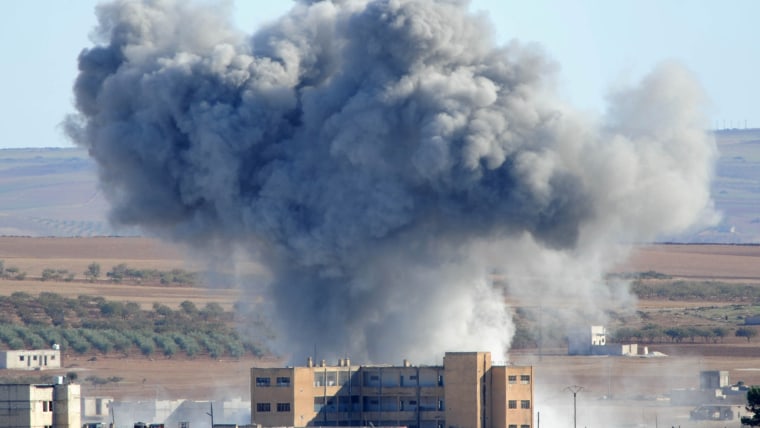In the wake of this week's terrorist attack in Brussels, President Obama's critics raised familiar and predictable complaints. Why isn't the Obama administration going after ISIS? When is the White House going to get tough on terror?
We were reminded again this morning, however, that the gap between perceptions and reality is often significant.
ISIS' second in command, Haji Imam, was killed during a raid this month, U.S. defense officials announced Friday. Imam was a finance minister who oversaw all the funding for ISIS' operations, said Defense Secretary Ash Carter.
Imam's death comes on the heels of a U.S. airstrike in Syria that reportedly killed another top ISIS commander, Omar al-Shishani. The combination of the two, NBC News reported, "are major scores for U.S.-led coalition forces in taking out the biggest names on the U.S.'s terror hit list."
These announcements coincide with the Washington Post's report that, on the battlefield, ISIS is "a rapidly diminishing force." The article added, "Nowhere are they on the attack. They have not embarked on a successful offensive in nearly nine months. Their leaders are dying in U.S. strikes at the rate of one every three days, inhibiting their ability to launch attacks, according to U.S. military officials."
As for the territory controlled by ISIS, according to Pentagon officials, the terrorists' area has shrunk by 40 percent since its 2014 peak, "a figure that excludes the most recent advances."
In fairness, we've seen reports like these before, only to learn soon after that ISIS has regrouped and made fresh gains.
That said, much of the evidence is not in dispute: ISIS is obviously still capable of pulling off deadly strikes against civilian targets, but on the ground in Syria and Iraq, the terrorist network is losing leaders and land. The U.S. military offensives have made a difference.
The political question is when Republicans are going to notice.
Ted Cruz recently said, "I recognize that Barack Obama does not wish to defend this country. He may have been tired of war, but our enemies are not tired of killing us." Marco Rubio believes the president is only fighting a "rhetorical" war on terror.
Senate Majority Leader Mitch McConnell was asked in January about whether Congress might eventually authorize the mission against ISIS that began in 2014. The Republican leader balked. "I don't want to tie the hands of the next president," McConnell said. "The next president may want to actually defeat ISIL."
The implication, obviously, is that this president doesn't actually want to defeat the terrorist group.
And yet, outside of the Republican bubble, Obama's counter-terrorism successes continue to pile up, including this morning's announcement about the U.S. strike that killed another ISIS leader. I'm reminded again of this piece in The Atlantic, in which Jeffrey Goldberg, hardly a liberal, wrote, "Obama has become the greatest terrorist hunter in the history of the presidency."
Mother Jones' Kevin Drum added this morning, "I wonder what Republicans will do if ISIS is truly on the run by the time campaign season starts in the fall? Whine that they could have done it even faster? Complain that we didn't steal all the oil while we were at it? They're barely going to know what to do with themselves if the weak-kneed appeaser Barack Obama first kills bin Laden and then takes out ISIS."
